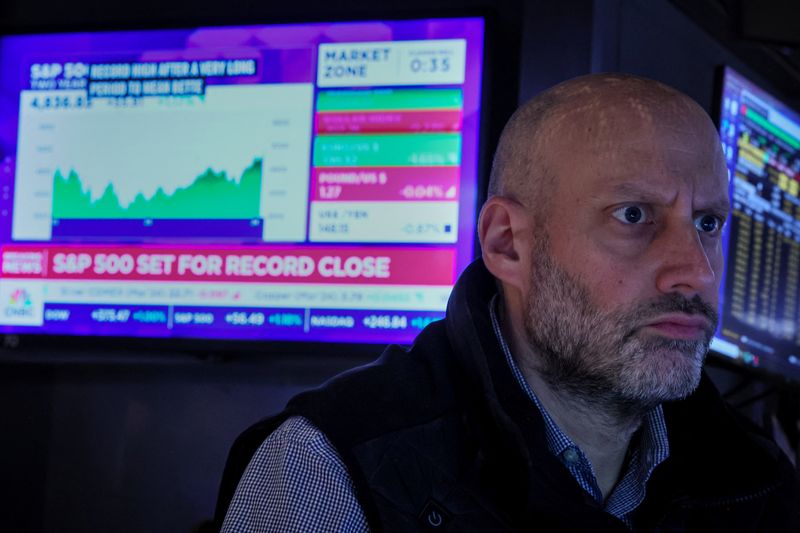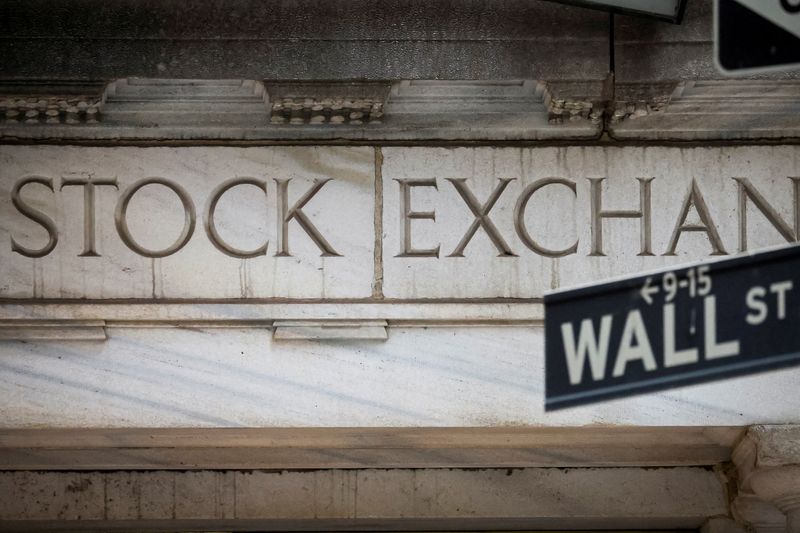By Lewis Krauskopf
NEW YORK (Reuters) - The U.S. stock market's march to all-time highs is putting the spotlight on its large valuation premium over global equities, leading some investors to look abroad for outsize returns.
The S&P 500 topped most key regional indexes in 2023 with a 24% gain, building on a decade of U.S. outperformance. The index is up over 2% so far in 2024, outpacing many rivals after notching its first record high in over two years last week.
Many investors are reluctant to reduce their U.S. exposure, pointing to better economic and earnings prospects in 2024 for the country over Europe and other regions. The S&P 500's heavy weighting in technology companies also stands to draw investors who want to bet on new fields like artificial intelligence.
But the valuation gap between the S&P 500 and MSCI's index of stocks in over 40 other countries is near its widest in over 20 years, and some investors are betting the opportunity abroad is too much of a bargain to pass up.
International equity funds notched $73.6 billion in net inflows in 2023, while U.S. equity funds had $52.1 billion in net outflows, EPFR data showed, although both flows represent roughly 1% or less of overall assets for each category.
"I don't think you can justify that record-wide gap between the U.S. and the rest of the world, and as that closes, that is going to benefit international markets," said Jeff Kleintop, chief global investment strategist at Charles Schwab (NYSE:SCHW).
"Most people are probably underweight where their long-term allocation to international (stocks) should be, and now is the time to consider upping that."
The S&P 500 is trading at nearly 20 times forward earnings estimates, well above its long-term average of 15.6. By contrast, MSCI's all-country world index that excludes the U.S. is trading at 12.8 times below its historic average of 13.5. That gap is close to its widest in over two decades.
Plenty of investors are happy to pay that premium for U.S. stocks. U.S. gross domestic product is expected to rise by 1.6% in 2024, against 0.7% for the Euro area and 0.9% for Japan, according to World Bank forecasts.
China's stock market, meanwhile, tumbled over 10% in 2023 and has extended its slide this year, with a deepening property crisis and local government debt crunch among the factors spooking investors.
S&P 500 companies are expected to increase earnings by 10.6% in 2024, nearly twice the pace of Europe's STOXX 600, according to LSEG Datastream.
The question is, however, whether those U.S. advantages are already more-than-reflected in stock prices.
Vanguard's economic models, which take valuation into account, projects U.S. equity returns over the next decade at an average annual rate of 4.2% to 6.2%. Ten-year projections are rosier elsewhere: 7% to 9% annualized return for non-U.S. developed markets, and 6.6% to 8.6% for emerging markets. "In the case of the U.S., we see that market is expensive," said Roger Aliaga-Diaz, head of portfolio construction at Vanguard. "That predicts a much lower return environment for U.S. equities than for ex-U.S."
Japan's stock market is also rallying, with the Nikkei already up 8% this year at 34-year highs.
LPL Financial (NASDAQ:LPLA) recommends investors "overweight" Japanese equities in portfolios, noting still-cheap valuations despite recent gains, improving technical factors and companies' improved focus on shareholder returns.
But the firm is "underweight" Europe, having downgraded international developed markets overall in October to "neutral," while upgrading the U.S. to "overweight."
While valuations in international developed markets are attractive, "they have been attractive for a long time," said Jeffrey Buchbinder, chief equity strategist for LPL Financial. "We want more than just cheap valuations to get more interested in international."
Investors have been rewarded for sticking with the U.S. in recent years. The S&P 500 is up 160% over the past decade, versus 130% for the Nikkei, 40% for the STOXX and about 10% for the MSCI all-country index that excludes the U.S.

Hans Olsen, chief investment officer for Fiduciary Trust Company, said U.S. stock valuations are more reasonable when removing the impact of heavily weighted tech and growth shares that are more expensive.
At the same time, he is confident that a strong U.S. economy will translate into solid corporate profits, helping U.S. stocks outperform international markets this year. "If you have an economy that is actually a bit stronger than people are giving it credit for ... that should flow through to the earnings," Olsen said.
